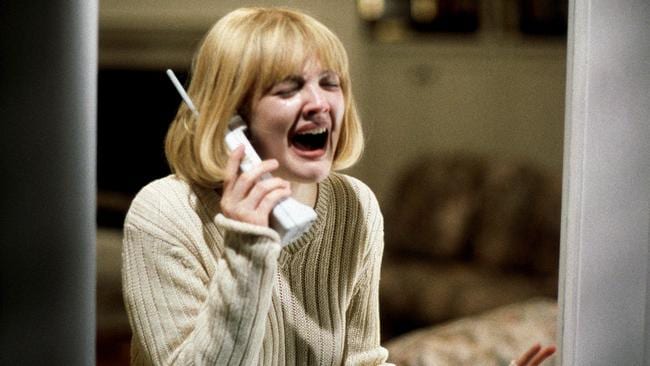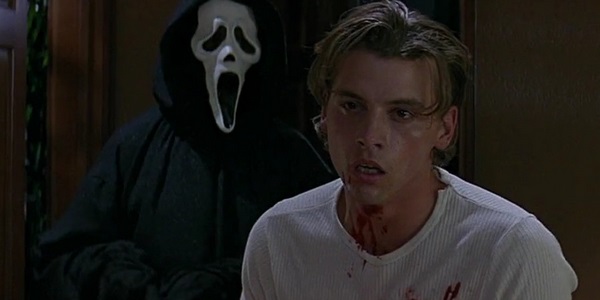31.8.19
"One of the troubles with being over-articulate, with having a vocabulary more refined than your emotions, is that every turn in the conversation, every switch of posture, opens up an estate of verbal avenues with a myriad side-turnings and cul-de-sacs – and there are no signposts but your own sincerity and good taste, and I've never had much of either. All I know is that I can go down any one of them and be welcomed as a returning lord." – Martin Amis, The Rachel Papers
20.8.19
Wild Things
Probably the last gasp of the 90s erotic noir, and while the film looks sleazy on the surface, it's actually redeemed by the increasingly ridiculous plot twists that start popping up half-way through, which show that basically no one is what they appear to be on the surface. Characters who you are set up to believe are victims turn into master manipulators, and vice versa. And while the portrayal of Denise Richards and Neve Campbell is exploitative, the film refuses to condescend to them, and hands ultimate victory to the latter.
The film is notorious for the scenes in which Richards and Campbell make out, although the film is at its queerest when Kevin Bacon surprises Matt Dillon in the shower – and there's a brief flash of full-frontal male nudity. Apparently, and enticingly, Dillon was supposed to join Bacon in the shower and kiss him, revealing a sexual relationship between the two men. Depressingly the financiers quashed the idea, although Bacon (who is also the film's producer) was pretty attached to it. Ultimately it's left as subtext, but it would have been a neat mirroring of the relationship between Richards and Campbell, and would enforce the prevailing mood that sexuality is a mutable thing in the Florida heat.
The director John McNaughton wanted to make the setting as beautiful as possible, to contrast with the beastly nature of the people within it. The film takes great pains to establish the contrast between the swamps swimming with alligators and the wealthy society living next door, with Matt Dillon's character sashaying comfortably through both environments. The metaphor is probably most acute with the crocodile tamer McNaughton keeps returning to – a nod to the attractions and dangers of playing with wild things. The film's conceit is that humanity has not sloughed off the evolutionary imperative to eat or be eaten – if anything our ability to dissemble makes us more ruthless. It's telling that McNaughton wanted to make a sequel with the kids of the characters who emerged on top in this film, underlining the macabre notion that the survival of the fittest would create ever more gruesome human beings.
The film is notorious for the scenes in which Richards and Campbell make out, although the film is at its queerest when Kevin Bacon surprises Matt Dillon in the shower – and there's a brief flash of full-frontal male nudity. Apparently, and enticingly, Dillon was supposed to join Bacon in the shower and kiss him, revealing a sexual relationship between the two men. Depressingly the financiers quashed the idea, although Bacon (who is also the film's producer) was pretty attached to it. Ultimately it's left as subtext, but it would have been a neat mirroring of the relationship between Richards and Campbell, and would enforce the prevailing mood that sexuality is a mutable thing in the Florida heat.
The director John McNaughton wanted to make the setting as beautiful as possible, to contrast with the beastly nature of the people within it. The film takes great pains to establish the contrast between the swamps swimming with alligators and the wealthy society living next door, with Matt Dillon's character sashaying comfortably through both environments. The metaphor is probably most acute with the crocodile tamer McNaughton keeps returning to – a nod to the attractions and dangers of playing with wild things. The film's conceit is that humanity has not sloughed off the evolutionary imperative to eat or be eaten – if anything our ability to dissemble makes us more ruthless. It's telling that McNaughton wanted to make a sequel with the kids of the characters who emerged on top in this film, underlining the macabre notion that the survival of the fittest would create ever more gruesome human beings.
15.8.19
Scream
There is a strain of nastiness to Wes Craven that I find a little unsettling. For the pivotal initial sequence in Scream, Drew Barrymore had told him about an instance of animal cruelty that had horrified and upset her, the memory of which Craven then used during the shoot to elicit a more convincing performance. That requires a lot of trust between director and actor, and in fairness, Craven acknowledges and is grateful for Barrymore's courage in making herself vulnerable in front of the camera. But having a director resort to such methods is still a bit unnerving.
The script was shopped around and could have gone in a bunch of ways, but with Craven attached it ends up as a genuinely scary movie – at least until the killer is unmasked and the film skips into absurdity. The irony of characters in a slasher film being aware of the conventions of slasher films is heavily present throughout, but the meta element becomes almost deafening in the scenes between Neve Campbell's 'final girl' Sidney and her boyfriend Billy (played by Skeet Ulrich as if he's channelling Johnny Depp). The latter speaks almost exclusively in film metaphors, so we really should have seen it coming.
The killer's motives are a joke, and used as just another comment on horror films (it's scarier if you don't know apparently). In fact the real motive is something Craven has been exploring throughout his career – the derangement of not being able to differentiate between reality and fiction. The money shot (horror films are in their way just as formulaic as porn) that encapsulates Scream is the TV falling on the killer's head and frying his brain. These kids are exactly what the censors of video nasties fear – that watching this stuff can turn you into a violent maniac. And the fact that it was accused of inspiring copycat murders perfectly rounds off the film's satirical project.
The script was shopped around and could have gone in a bunch of ways, but with Craven attached it ends up as a genuinely scary movie – at least until the killer is unmasked and the film skips into absurdity. The irony of characters in a slasher film being aware of the conventions of slasher films is heavily present throughout, but the meta element becomes almost deafening in the scenes between Neve Campbell's 'final girl' Sidney and her boyfriend Billy (played by Skeet Ulrich as if he's channelling Johnny Depp). The latter speaks almost exclusively in film metaphors, so we really should have seen it coming.
The killer's motives are a joke, and used as just another comment on horror films (it's scarier if you don't know apparently). In fact the real motive is something Craven has been exploring throughout his career – the derangement of not being able to differentiate between reality and fiction. The money shot (horror films are in their way just as formulaic as porn) that encapsulates Scream is the TV falling on the killer's head and frying his brain. These kids are exactly what the censors of video nasties fear – that watching this stuff can turn you into a violent maniac. And the fact that it was accused of inspiring copycat murders perfectly rounds off the film's satirical project.
10.8.19
Subscribe to:
Posts (Atom)




